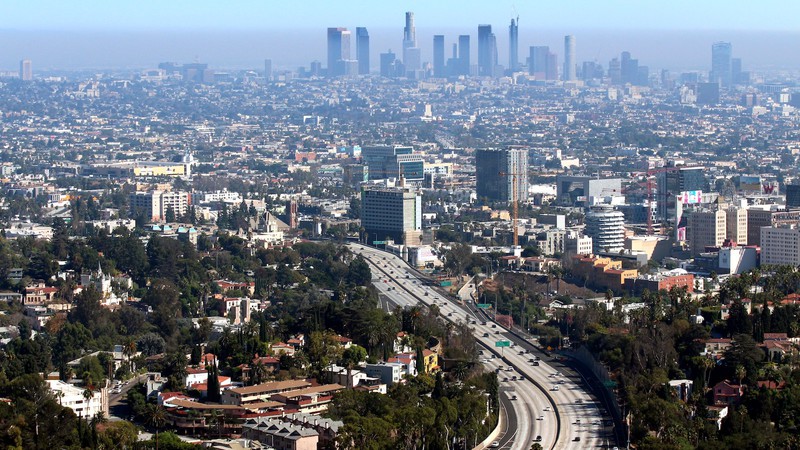As consumers require less gas for their cars, they'll also be paying out less in gas tax to the state.

Funding for California's roads and highways could be a casualty of the transition to electric vehicles. Prayitno / Wikimedia Commons C.C. Share Alike 2.0 Generic license
BY , CalMatters
California’s funding from gas taxes will drop by nearly $6 billion in the next decade due to the state’s electric car rules and other climate programs, “likely resulting in a decline in highway conditions for drivers,” according to a new state analysis released today.
The state will still see a $4.4 billion drop in funding, a 31 percent decline, over a decade, so the Legislature and governor must come up with substantial new funding sources.
As California phases in major policies aimed at reducing greenhouse gas emissions—such as the mandates for zero-emission cars and trucks—consumers buy less gasoline and diesel, and consequently pay less taxes.
Those declines in tax dollars will be partially offset by the state’s road improvement fee, which drivers pay when they register their electric cars. But the Legislative Analyst’s Office stressed that overall the state will still see a $4.4 billion drop in funding, a 31 percent decline, over a decade, so the Legislature and governor must come up with substantial new funding sources.
Unless the drop is accounted for with new fees or other funding, there would be substantially less money for highway programs as well as local road maintenance, the analysts wrote. Work supporting buses, trains and other public transit options across the state also would face drops in funding.
“As the state tries to meet its ambitious climate goals through the adoption of zero emission vehicles, and greater fuel efficiency within conventional vehicles, the report finds that we’ll see a decline in fuel tax revenues,” said Frank Jimenez, a senior fiscal and policy analyst with the office.
Highway maintenance is funded primarily by the fuel taxes “and therefore will face significant funding declines,” the report says.
Fuel taxes and vehicle fees fund about a third of state spending on transportation. This year’s budget, passed in June, includes about $14.2 billion in state funding for transportation.
The report projects declines of $5 billion, or 64 percent, in the state’s gasoline excise tax, $290 million, or 20 percent, in the diesel excise tax and $420 million, or 20 percent, in the diesel sales tax, over the next decade.
Highway maintenance is funded primarily by the fuel taxes “and therefore will face significant funding declines,” the report says. “…We project funding for these programs will drop by roughly $1.5 billion (26 percent) over the next decade, from $5.7 billion to $4.2 billion.”
The state’s transportation agency, Caltrans, declined to comment. “Caltrans is reviewing the report but does not comment on potential legislative proposals,” a spokesperson said.
Lawmakers could make up for the shortfalls in many of these programs by spending less on transportation, but that would likely mean worsening roads and highways, and also some public mass transit cuts. They might also consider further increasing gas taxes or vehicle fees. But that might have an outsized impact on the state’s lower-income communities, who are expected to adopt zero-emission vehicles more slowly as middle- or higher-income Californians.
The report comes as California is bracing for a projected $68 billion budget deficit next year. Gov. Gavin Newsom’s Finance Department on Tuesday ordered departments and agencies across government to reign in spending on everything from travel to office supplies.
Lawmakers also could consider using other state funds for transportation or implementing a road charge, which would tax people based on the number of miles they drive.
The report comes as California is bracing for a projected $68 billion budget deficit next year. Gov. Gavin Newsom’s Finance Department on Tuesday ordered departments and agencies across government to reign in spending on everything from travel to office supplies.
California aims to reduce its greenhouse gas emissions by 85 percent below 1990 levels by 2045, when the state is expected to reach a statewide goal of net zero emissions. One of the most prominent ways the state is doing that is by banning the sale of all new gas-powered cars by 2035.
The article titled "California gas tax revenue will drop by $6 billion, threatening roads" appeared first at CalMatters here: https://calmatters.org/environment/2023/12/gas-tax-revenue-drop-climate/
CalMatters is a nonprofit, nonpartisan media venture explaining California policies and politics.